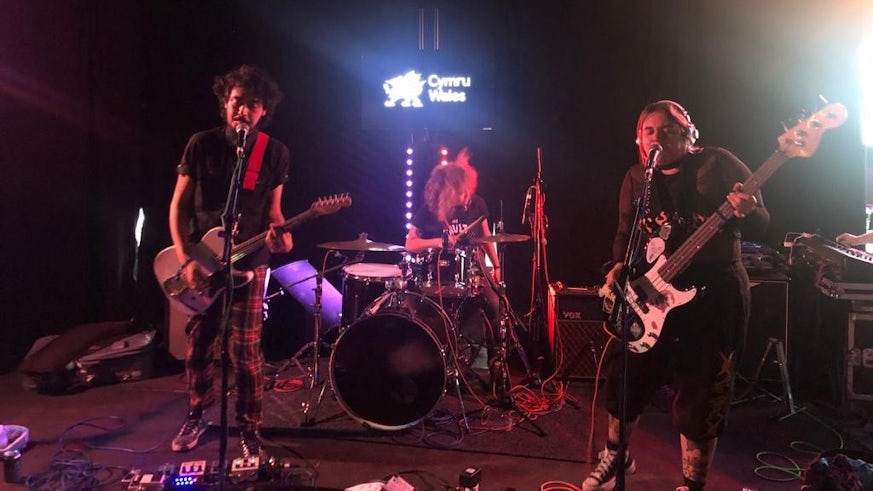School of Welsh staff member takes part in the Focus Wales music festival
1 June 2023

A member of the School of Welsh staff has taken part in research work at a recent music festival in Wrexham.
Focus Wales music festival is a partner in a special research project between Cardiff University and Waikato University which looks at the links between Welsh music and Māori punk music. A number of university staff undertook research work during the festival. Dr Elen Ifan was there from the School of Welsh, and she talks below about her experiences of being at the festival.
Wrexham has become world famous over the last few years following the successes of the football team, with visitors from all over the world calling in for a pint at the Turf (and a photo with the Deadpool statue). But it wasn't the Racecourse that was drawing people to Wrexham between the 4th and 6th of May, but the Focus Wales music festival. The festival gave a platform to performers from Wales and beyond across 20 different locations. Among them were Half/Time, the post-punk band from Aotearoa (New Zealand) who use te reo Māori (the Māori language) in their songs, and myself, Dr Joe O'Connell from the School of Music, and Catrin Jones from Yr Academi Gymraeg. The three of us weren't there to perform, but rather to conduct interviews throughout the weekend with performers as part of a special joint research project between Cardiff University and Waikato University (and caught a few gigs, of course!)
The intention of the project is to find points of connection between the Māori experience and the Welsh experience in the context of 'grassroots' music - or music that is beyond the mainstream. We will explore questions of identity, belonging, creativity and language through the work of these musicians, starting with interviewing individuals during the Focus Wales festival.
The weekend promised to be a busy one from the start, as I set an early alarm to make sure I was up in time to talk with Gwenllian Grigg and Dylan Ebenezer on the breakfast time programme ‘Dros Frecwast’ on BBC Radio Cymru. The project has received a lot of media attention, including an article in The Guardian, and it’s been great to see the public response to the project.
It was a rush after the chat to finish packing and catch the train, before going straight over to meet Half/Time and watch them perform their first gig in Wales: a session for Glyndŵr TV at Glyndŵr University studios. Having seen them in Zoom meetings at quite unsociable hours (a 12-hour time difference is challenging when you want to arrange a meeting!), and hearing so much about their music, it was a special experience to see them perform. The music is political, challenging, and extremely powerful, and everyone in the studio on Thursday afternoon were blown away by the band.
On Friday and Saturday, we started in earnest on the interview work, and although it was hard work at times when arrangements were changed at the last minute or a participant disappeared to do a sound check, we collected a lot of very interesting data through the interviews. The next stage of the work will be to transcribe the interviews so that we can analyze the data, and to present the results in the form of an academic output of some kind – a conference paper, or an article – in due course.
Another part of the project is @prosiectPuutahitanga, which is a dedicated Instagram account for the project and is a means of recording the activities and reactions of those who are part of the project in a collaborative and creative way. We had fun thinking about a word of the day each day, recording our ideas on the back of a paper bag, which has been an interesting starting point to thinking about important concepts for us as researchers. ‘Yma o Hyd' (Still Here) was one of the songs that we talked about - so on the train on the way home I wrote a little piece based on our informal conversations: ‘Mae te ao Māori / Yma o Hyd’ (The Maori world is still here).
The project activities continued throughout the following week, with more gigs by Half/Time across Wales, together with a successful panel discussion organized by Yr Academi Gymraeg at Cardiff University.

But as a project team we also intend to expand the work further: plans are underway to visit Kirikiriroa (Hamilton) in Aotearoa in the autumn, to hold workshops, to meet with more musical artists who use te reo Māori, and to continue the exciting research work that began in Wrexham at the beginning of May.
